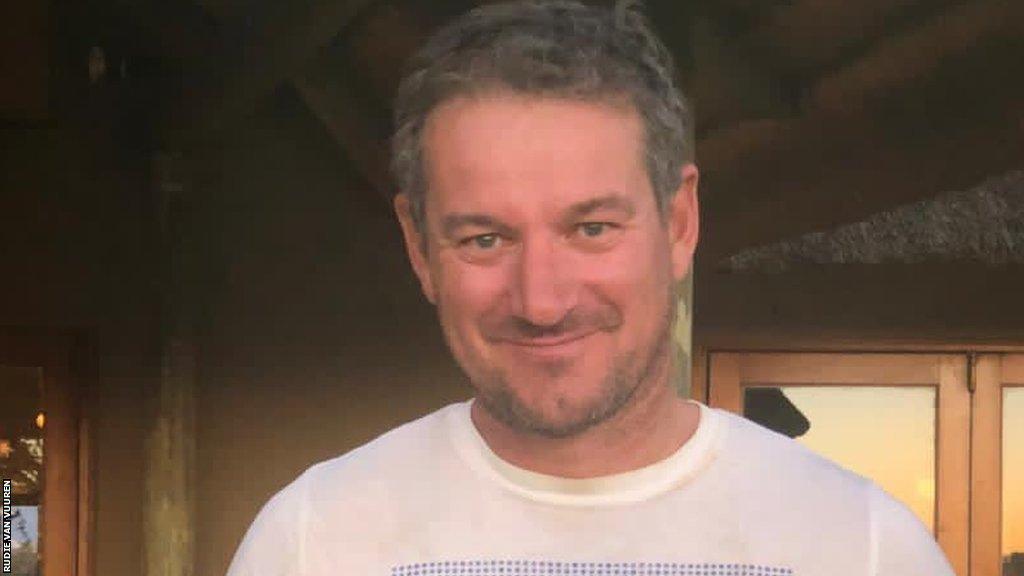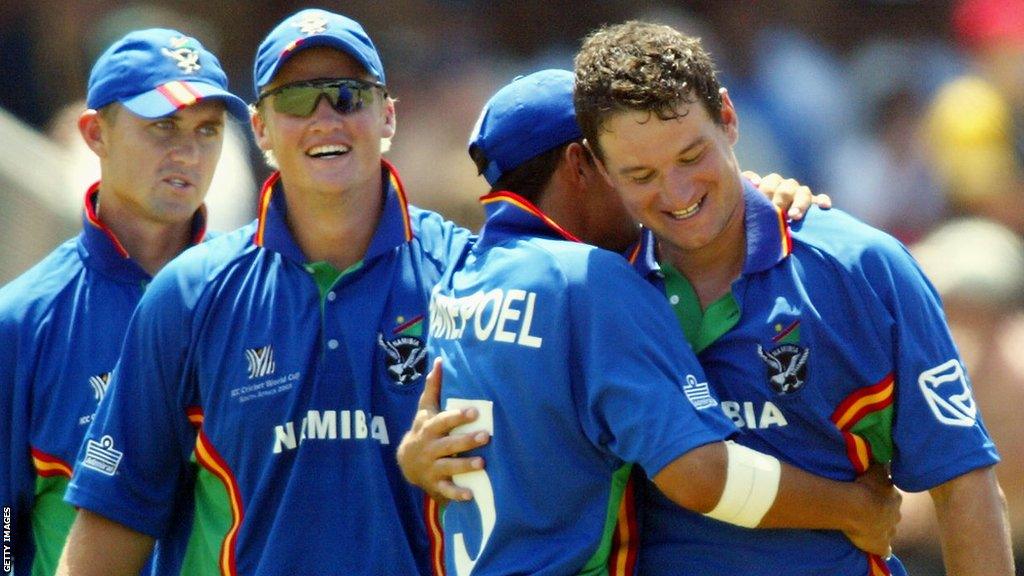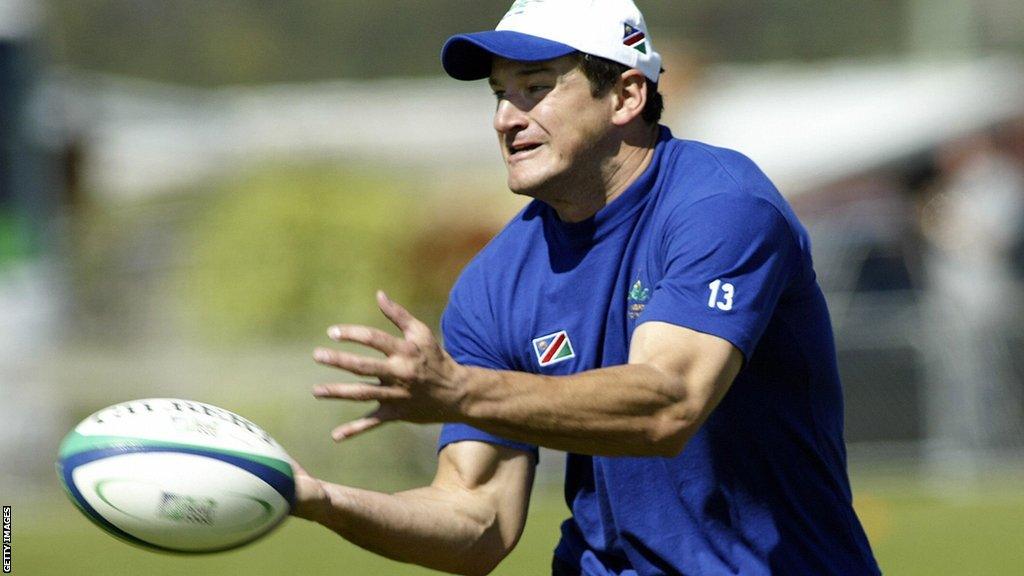Rudie van Vuuren: Meet the 'Doc' who played at World Cups in two sports
- Published
- comments


Rudie van Vuuren played at both the Cricket World Cup and Rugby World Cup in 2003
Sign up for notifications to the latest Insight features via the BBC Sport app and find the most recent in the series.
"You know, sometimes rugby players on cricket fields are not good things."
As the only man to have ever played in both a Rugby World Cup and Cricket World Cup, Rudie van Vuuren knows what he's talking about.
Male rugby players may be known for their machismo, but in 2003 Van Vuuren took his into a Cricket World Cup too - telling Pakistan captain Waqar Younis his fellow fast bowlers Wasim Akram and Shoaib Akhtar might lack a bit of pace.
That's Shoaib, who six days later would deliver the fastest ball ever recorded -100.2mph (161.3km/h) - against England.
And here he was facing a little-known tailender making his one-day debut, on its greatest stage, for cricketing minnows, in their first World Cup. The odds were stacked firmly against Van Vuuren.
"We were 42-9. I came in at number 11 and, at that stage, the lowest total in a World Cup was 45 all out," says Van Vuuren.
"I remember our team manager saying to me just before I walked out: 'Doc, just keep us out of the record books.'"
The team manager seemingly failed to mention anything about sledging some of the game's legends, however.
"At the drinks break, I said to Younis: 'Waqar, you're never going to get me out with these seamers. You need to bring on the spinners because Shoaib is not fast enough.' He just lost it, and got really angry with me."
Within minutes, Shoaib was pummelling Van Vuuren to the extent he bowled what was then the World Cup's fastest ball - clocking 98.5mph (158.5km/h).
But Namibia's last man did not just hold firm in the five balls he faced from Shoaib and the 11 from Wasim - he hit both men for four.
And his brave batting display - 14 runs from 19 balls, which could not save the match but ensured Namibia made it to 84 - ended when he was bowled not by a speed merchant, but by spinner Saqlain Mushtaq.
"It was a great experience playing against the top of the world's best players," says Van Vuuren, who like all of his team-mates was an amateur.
"Sport at that level is a mental thing. If you're going to be intimidated by a ball of 160 km/h, you don't belong."
Cricketing fairytales
When Namibia's team manager called Van Vuuren 'Doc', he did so because he was already a qualified physician.
That meant that as the tournaments approached - unlike now, they were played at different times of the year - Van Vuuren had other things on his mind.
"I was a full-time doctor in private practice so that made it very difficult," he says. "When I played rugby and cricket, I didn't get paid - I lost money - but I knew then that the sport would end one day.
"We were just amateurs, with a very good cricket team. It would have been better if we had beaten one or two big names, but we couldn't."
Van Vuuren and his team-mates lost all 10 games they played across both tournaments, but that didn't stop him impressing - particularly in the cricket.
Namibia faced heavyweight opposition in that tournament, which was staged in Africa for the first time. After opening the tournament against co-hosts Zimbabwe, they met Pakistan, England, India, Australia and the Netherlands.
Van Vuuren smiles as he recalls hitting England legend James Anderson for six - describing it as the "the best thing of that game", even though he then took five wickets. "Pretty amazing," he says, "against the nation that invented cricket."
It remains the only time a Namibian has taken five wickets in a Cricket World Cup match, and includes another dose of sledging from 'Doc' - this time for future England captain Michael Vaughan.
"He was not impressed," says Van Vuuren. "He gave me a look and I thought, 'maybe that's not the right guy to chirp.'"

Van Vuuren is congratulated after taking his fifth wicket against England
Next in line to beat Namibia were India, but Van Vuuren did have the distinction of taking his side's only two wickets - including breaking the stumps of the legendary Sachin Tendulkar.
"When he had eight runs or so, I bowled him an absolute screamer and he played, missed, looked at me and nodded his head," Van Vuuren says, grinning. "Over a hundred runs later, I eventually got him!
"I asked him for a photo and he sat down with me and we talked for a long time. I remember thinking, 'what an incredible sportsman - so humble, so successful, never controversial and here he sits down with a Namibian player - he doesn't need to do it.' It was a humbling experience."
Another soon followed, albeit in a different way, against eventual champions Australia - as Darren Lehmann thrashed Van Vuuren for 28 off his side's final over en route to a thumping win.
"At lunchtime, I walked past Darren and he said: 'Sorry for ruining your World Cup, mate.' I took it in good spirits. It was terrible, but it happens. My son still teases me about that."
With figures of 0-92 from his 10 overs, Van Vuuren was then out for a duck - as he would be in the final game against the Netherlands.
Cracking the codes
Van Vuuren grew up in Windhoek - the capital of a vast nation more than double the size of Germany, with a population of under three million.
He does not remember a time before he played both cricket and rugby, but it was the oval ball that was his primary love. Nonetheless, he made his international cricket debut first - winning his first cap in 1997, just three weeks before doing likewise in rugby.
It was the start of a way of life that would involve regularly swapping between the sports, working out how to juggle his working life with his sporting life, and getting used to either gaining or losing weight.
"It was difficult being a very busy medical doctor and playing sport, especially two codes," he says. "There was no time for watching TV, relaxing or anything like that - it was sport and work, and that was it.
"And it was difficult to morph from a rugby body to a cricket body in a couple of weeks. I would play cricket, then gain five kilograms and play rugby, then lose five kilograms and play cricket.
"I became very, very disciplined at managing my time and my diet, and that is one of the greatest things I've learned from sport - how to be disciplined."
That discipline was evident between the World Cups, as Van Vuuren returned to work.
As one of few obstetricians then in Windhoek, he delivered 70 babies. And it was then he became aware of his own entry - into the annals of sporting history.
"I didn't even know it was something special," he says. "Then a journalist phoned me and said: 'Did you know that no-one else has ever played in a rugby and cricket World Cup, or even in two World Cups in different sports codes, in one year?'
"I said I didn't, and then all of a sudden it became something."
History beckoned, but on the eve of Namibia's Rugby World Cup opener against Argentina, misfortune struck as the team trained in Australia.
"It was the last sprint," says Van Vuuren, "and when I heard my calf go, I just knew."

Van Vuuren played rugby union 15 times for Namibia
'Can we not play a little more?'
Van Vuuren's medical knowledge made the pain even more acute given he knew the significance - especially once the results came back.
"The scan just showed everything was torn," he says. "It was just utter, utter disappointment because physically I was in incredible shape, and I was so ready for that World Cup."
It was particularly cruel given he had missed the 1999 tournament after a row with Namibia's then coach.
The nature of the tear meant his calf needed between six and eight weeks to recover, but Namibia's group games all fell within a three-week period.
"You can only control the controllables so I tried to just stay as positive as possible and rehab," Van Vuuren says. "But I was sitting on the side, really wanting to play - and really wanting to fulfil the prophecy."
Van Vuuren sat out three heavy defeats, with the Welwitschias beaten 67-14 by Argentina and 64-7 by Ireland before hosts Australia inflicted a 142-0 hammering.
That result remains the biggest winning margin in a Rugby World Cup match, and there was further misery for Van Vuuren when a haunting figure returned as he spoke to two Australia players after the game.
"I was in reception talking to George Gregan and Joe Roff when I heard somebody whistle," he says. "I looked over and there was Darren Lehmann showing me [with his fingers] '28'. That's when I knew I would never get rid of this thing."
Namibia had just one match left - against Romania - and Van Vuuren was desperate. His calf was far from healed, but the burn inside him was to simply get on to the pitch.
"The pain was there but the levels were such I could actually make it onto the pitch. I said to the staff: 'I don't care what you do, I have to get on to the field.'
"Luckily Dave Waterston, our coach, backed me and said: 'Just go on.'"
Van Vuuren - his body stuffed with painkillers - had just under 10 minutes to make an impact, and was determined not to waste a second.
"I remember the first contact I made. I got the ball from the line-out and just thought, 'even if break my leg off now, I'm going to make it count.'
"I remember making a big tackle. I remember the contact was very hard, but I survived it and played."
Van Vuuren had done it. Yet the final whistle of a 37-7 defeat did not prompt celebration of his feat.
"I remember thinking, 'can we not play a little bit more?' It was disappointing, but I had to make peace with it.
"I was just relieved I got the opportunity, and thankful for the grace to get on to the pitch."
Renaissance man
Along with all his sporting achievements, Van Vuuren has also hung out with Hollywood royalty, and ensured the health of his nation's most important figure.
"Namibia's president, Hage Geingob, became my patient a little over 10 years ago - before he was president," he says. "When he became president, I travelled with him a bit and saw how other countries take care of their presidents so I helped develop the team that looks after his health."
Just last month Van Vuuren travelled with Geingob to the United Nations General Assembly in New York.
He has become "good friends" with a man he respects a great deal, but his work as a doctor has significantly reduced in recent years after opening an animal sanctuary - N/a'an ku se - a 30-minute drive from Windhoek.
In early 2011, the sanctuary received a significant financial injection and major publicity boost when actor Angelina Jolie and then husband Brad Pitt donated £1.3m shortly after spending Christmas there.
"Angelina and my wife have been friends for about 20 years," says Van Vuuren. "They met on a film set here in Namibia, and Angelina just became involved with what we do."
Not a man for a quiet life, Van Vuuren has also been president of Cricket Namibia since 2018.
Low in the rankings, with minimal bank funds and no women's team when he assumed control, the prospects did not look good.
But not only did they shine at the T20 World Cup in 2021 - beating Ireland and Scotland among others - the country has since won the right to co-host, along with South Africa and Zimbabwe, the 2027 Cricket World Cup.
"For our economy and cricket, it's going to be a massive injection," says Van Vuuren. "And just for us, a nation, it's one of the biggest things that will ever happen to us."
As he looks to uplift the next generation - including his son who, yes, plays both cricket and rugby - Van Vuuren spends little time reflecting on his 2003 feat.
"You must put it into perspective," he says. "We only have 20-30 good cricket players in the country. We only have about 100-200 good rugby players. So it was almost inevitable.
"I think, in that time, it was easier than now. It was never something big to me, but in the rest of the world it was an achievement. I was just lucky."

DNA's role in reconnecting families: Stacey Dooley meets people across the UK to help unlock mysteries hidden within their genetic code
Exploring Ireland's complex history: Fergal Keane charts the history of Ireland and her people from the earliest days to the present
